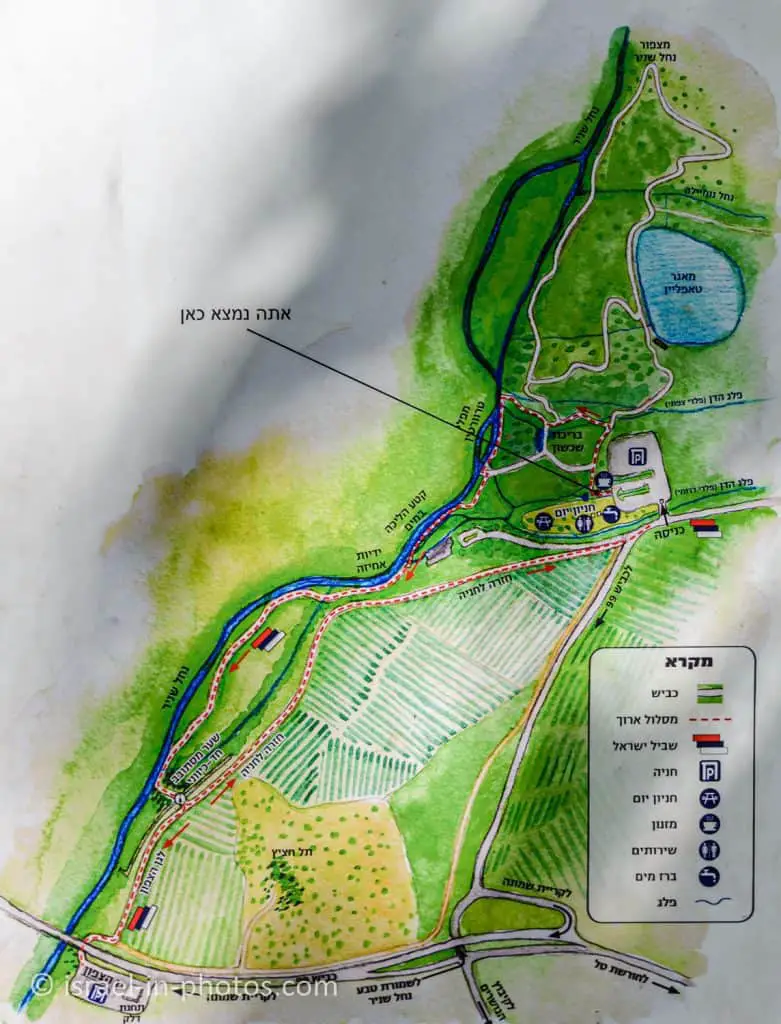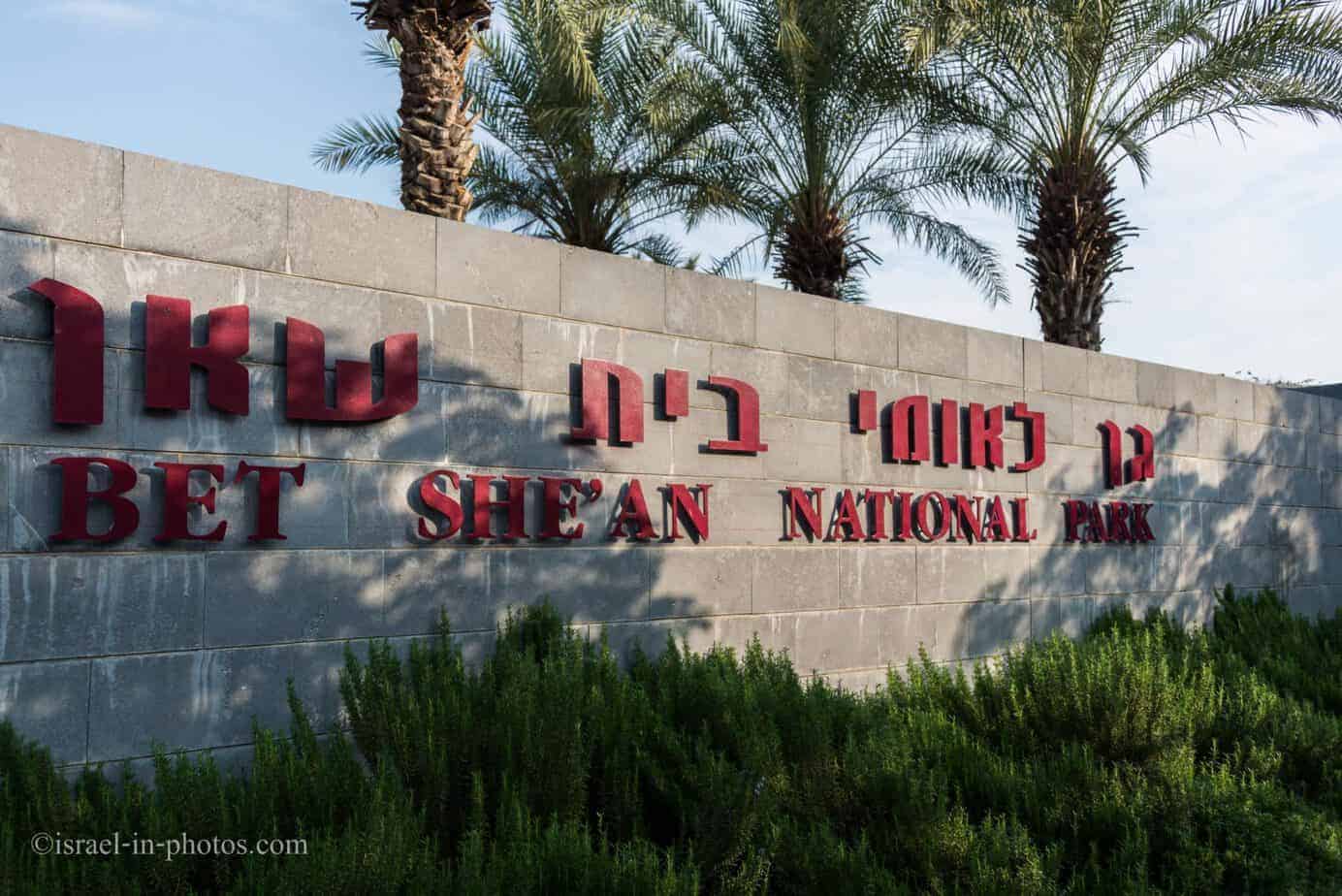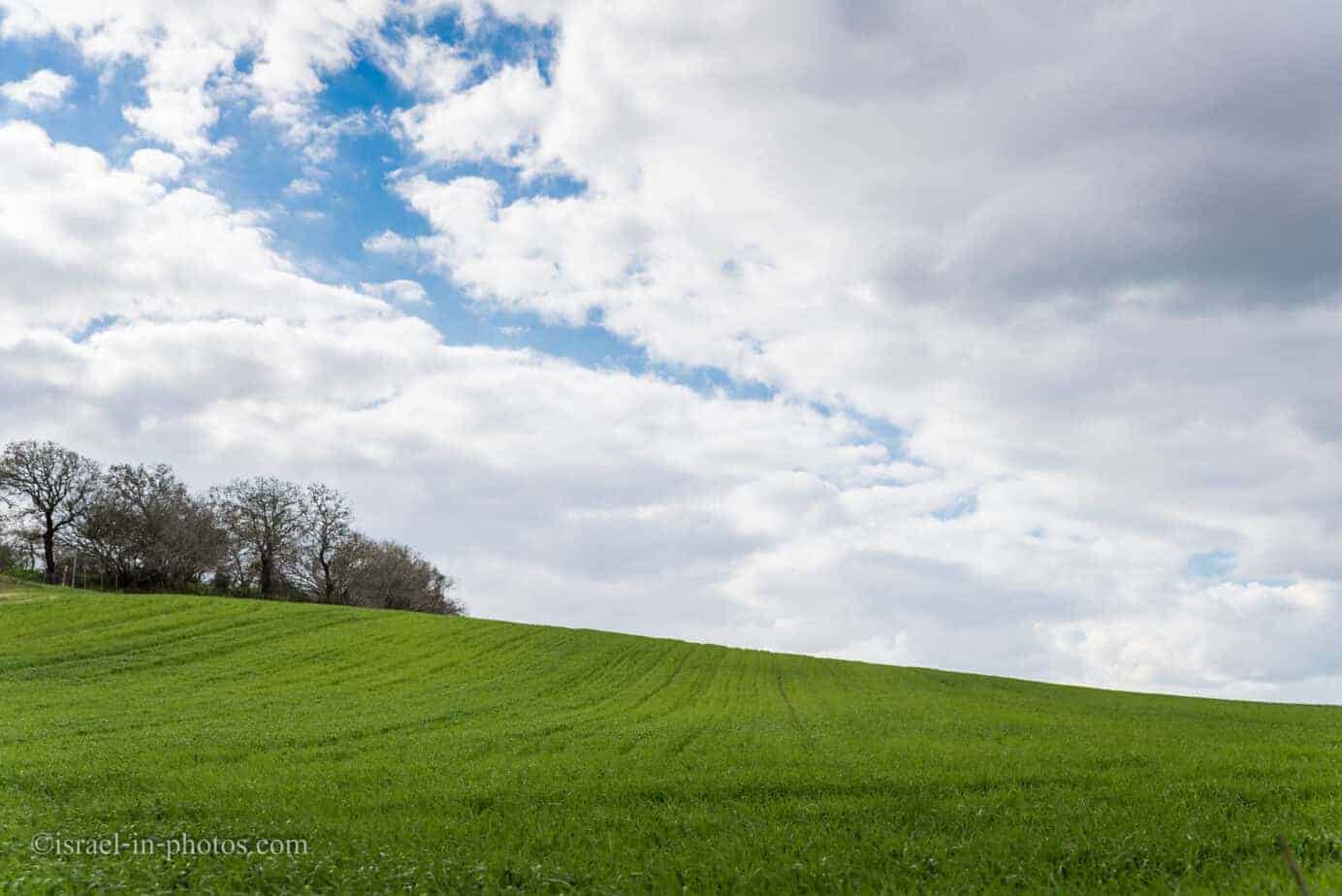Snir Stream Nature Reserve (Hasbani) – Visitors Guide
Snir Stream Nature Reserve (Hasbani) in Upper Galilee offers various nature hikes, including water trails. Thus, it is the perfect place for hot summer days.
Table of Contents
Map
Snir Stream Nature Reserve (Hasbani) is located in Upper Galilee near Kibbutz Dafna. If you are familiar with Dag Al Dan restaurant, the entrance to this nature reserve is very close to the restaurant. And the easiest way to reach this spot is by entering its name into Waze.
Directions for drivers: Link to Waze and Link to Google Maps
Directions for public transport: Link to Moovit
Interactive map of the area:
And here is its map:
Closeup map:
Note: you can click on the map to enlarge it.
Trails
On the first map, you can see the long trail. On the second map, you can see several shorter paths. Here is an interactive map from israelhiking.osm.org.il where these trails are marked:
And here are the details of the tracks:
| Name | Color of the Trail on the Map above | Color of the Trail in the Official Booklet | Description | Distance (km) | Total climb and descent (meters) | Average duration (minutes) | Notes |
|---|---|---|---|---|---|---|---|
| Accessible loop trail – short trail | Red | The trail leads from the parking lot to the wading pool and back. | 0.7 | 20 | 15 | ||
| Medium trail | Blue | Light Blue | See the age recommendation in the medium path. | 1 | 34 | 30 | According to the official booklet: “not recommended for children under five.” |
| To the TAP Line Reservoir | Black | Dark Blue | This trail leads to the bird hideout by the Tapline reservoir | 0.8 | 26 | 20 | I marked the trail and started the measurement from the first junction. |
| Snir Stream Lookout | Brown | Green | Extends the previous trail till Snir Stream lookout | 2.3 | 98 | 40 | I marked the trail and started the measurement from the first junction. |
| The long trail | Orange | Orange | Extended version of the medium path. | 2.7 | 88 | 90 | See age recommendation in the medium path. |
Note: the listed average durations are according to the official brochure. During our latest visit, we hiked the medium trail. And instead of the mentioned half an hour, it took us about two hours. That is because we made long breaks by the water (and most people do them).
All trails begin at the parking by the Snir Stream Nature Reserve (Hasbani) entrance, all of which are loop trails.

Opening Hours
Sunday – Thursday and Saturday: 8:00 – 17:00 (16:00 in winter).
Friday: 8:00 – 16:00 (15:00 in winter).
On holiday eves, usually 8:00 – 13:00.
Note: Since the pandemic, the Israel Nature and Parks Authority has started limiting the number of people in each park. Thus, reservations are recommended through the official site (you can find the link below).
Entrance Fee
Adult – 28 NIS, child – 14 NIS, and student – 24 NIS. Free for National Parks annual subscribers.
If you visit several National Parks, consider purchasing a combo ticket. For additional information, see National Parks and Nature Reserves.
Note: opening hours and ticket prices were updated in February 2023. In any case, recheck the official site before visiting.
Dogs
It is forbidden to enter Snir Stream Nature Reserve with dogs.
Picnic and Barbeque
You can find a picnic area, restrooms, and a kiosk near the parking lot.

According to the sign, the picnic area closes at 17:00 (16:00 in winter). Also, fires (barbecues or campfires) are prohibited throughout the reserve.
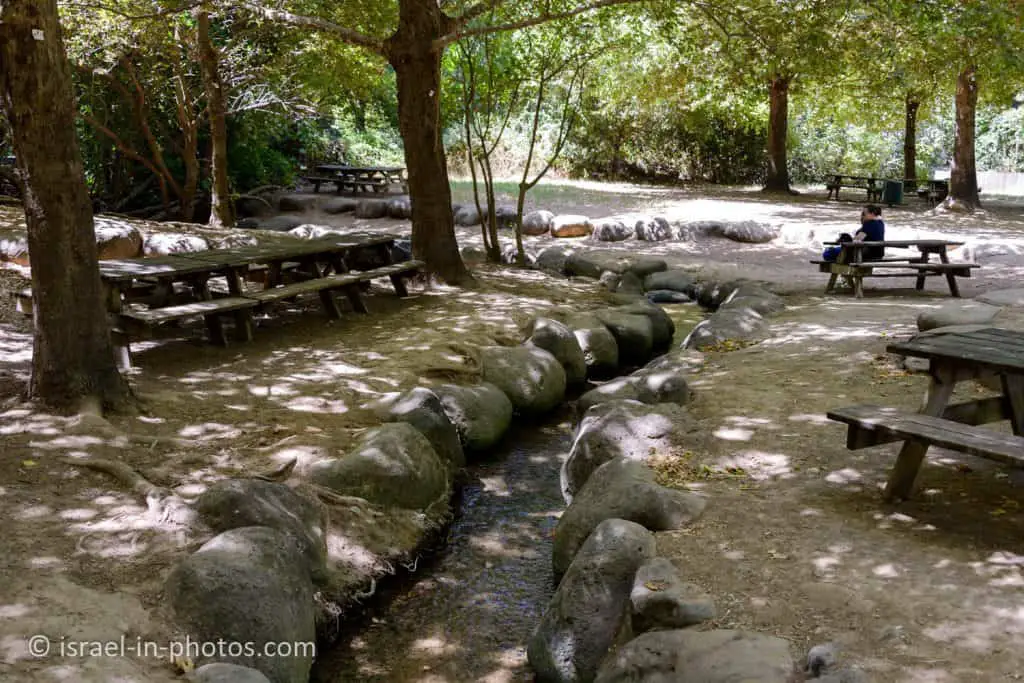

Contact Information
Phone: 04-6950064
Hasbani River or Snir Stream
This river flows in two countries. The Hasbani runs for 40 km in Lebanon before crossing the border at Ghajar. And then, Snir Stream joins Banias and Dan Rivers to form the Jordan River.
Hasbani is the name of this river in Arabic and is still called this way in Lebanon. And it is called after Hasbaiyya town in Lebanon, located near the stream. Snir is the Hebrew name.

What does Snir mean?
Snir Stream is named after Snir Mountain, which is one of the Biblical names of Mount Hermon.
Deuteronomy 3:9:
Hermon is called Sirion by the Sidonians; the Amorites call it Senir.
The Blue Loop Trail
If you plan on making one of the water hikes, wear water shoes. The wet trail has plenty of big rocks. Thus water shoes with sturdy soles would be the best alternative.

There are clear trail markings in this nature reserve. Thus, we did not use a map for the blue trail.

Note: flooding is a hazard at Snir Stream Nature Reserve (except in summer). Therefore, I would advise calling this nature reserve before visiting in the rainy season.

Since we visited during the summer vacation with the kids, we preferred the trail with lots of water. Hence we chose the blue trail, which goes through the wading pool and travertine falls.

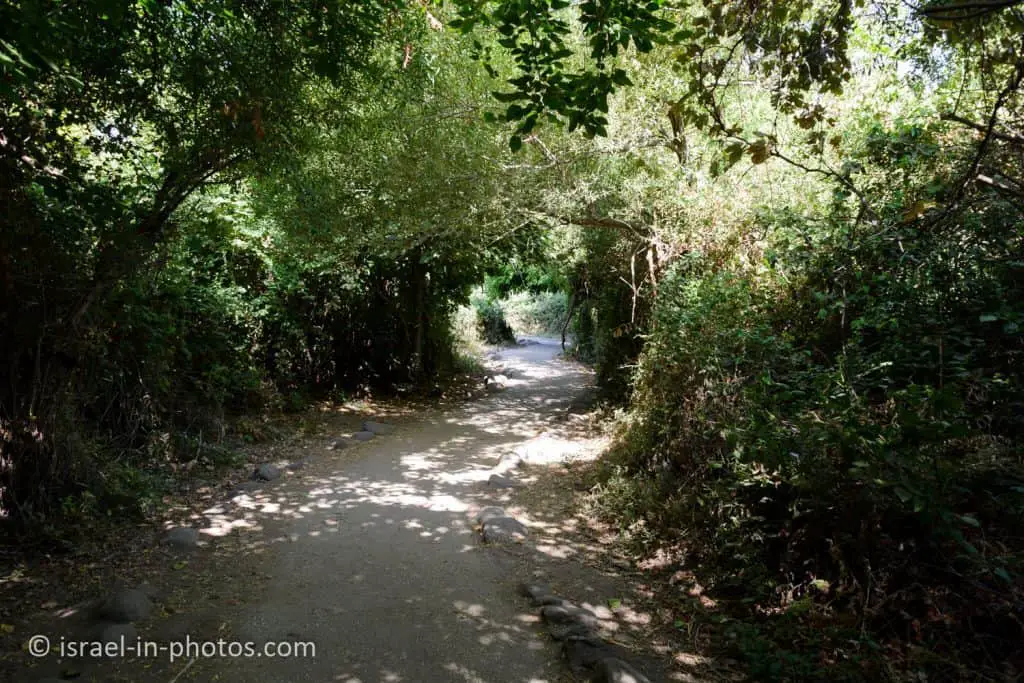
We continued along the red tail, and after five minutes, we reached the wading pool.
Wading Pool
The wading pool is not deep (40 cm), but the water was freezing even in August.
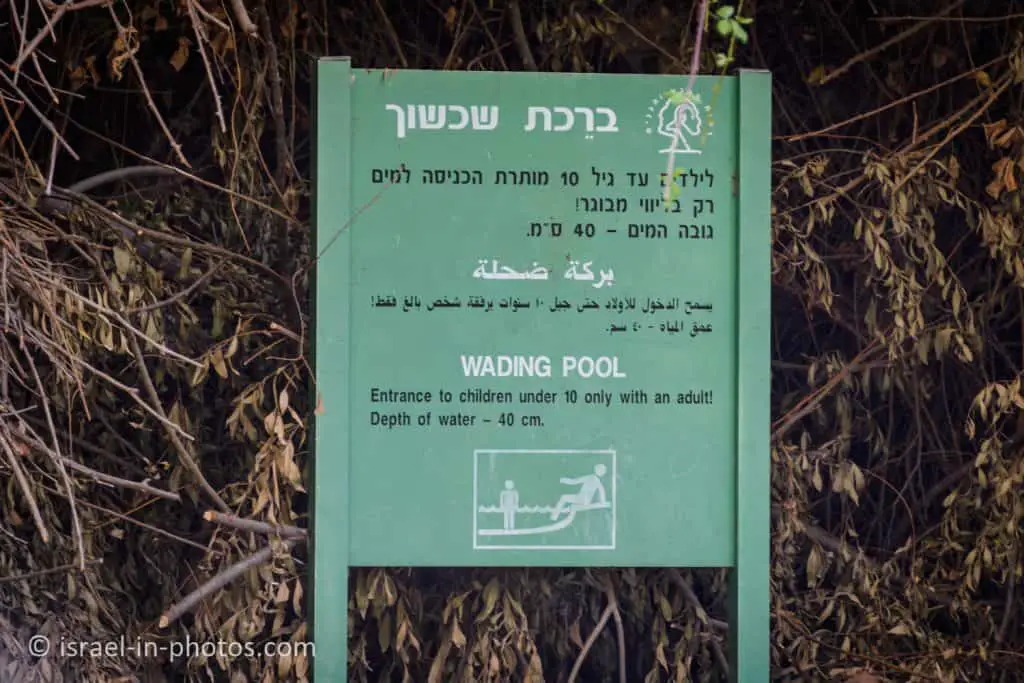

Man-made pools – between the parking area and the river itself, two pools have been excavated. One is a “wading pool” for visitors’ pleasure, while the second is a refuge for rare water plants, such as the yellow pond-lily (Nuphar lutea) or the dwarf water clover (Marsilea minuta), which are almost extinct in the wild in Israel.
Note: unless stated otherwise, all quotes were taken from the official site.

You can take the red trail from the wading pool, return to the parking lot, or continue along the blue path toward Snir Stream.
The Travertine Falls
After several minutes we reached the travertine falls. And as you can see in the following image, you can walk inside the river or use the path to the left.

Waterflow can be relatively strong, and many big stones may make you lose balance. Thus I preferred walking on the trail with my younger daughter, and my older daughter enjoyed the water hike.

The travertine falls – walking along the river bed, to the left of the trail are small waterfalls bringing the colder water of the Dan Stream into the Snir Stream. These falls burrow through a thick layer of a yellowish rock called travertine. This is a rock formed through processes of sedimentation (like the scale in a kettle), as a result of a continuous, slow current over many years. In fact, the entire eastern bank of the stream in the nature reserve is made of this rock – evidence of the strength of the flow in this area in the past.


As you can see in the next photo, we reached the end of this water section after walking in the water for ten minutes. We made a splashing break and continued with the blue trail (using the stairs to the left).

The following waterfall is the only section where you must enter the water. Thus, we had no problem completing the blue path with a two-year girl.
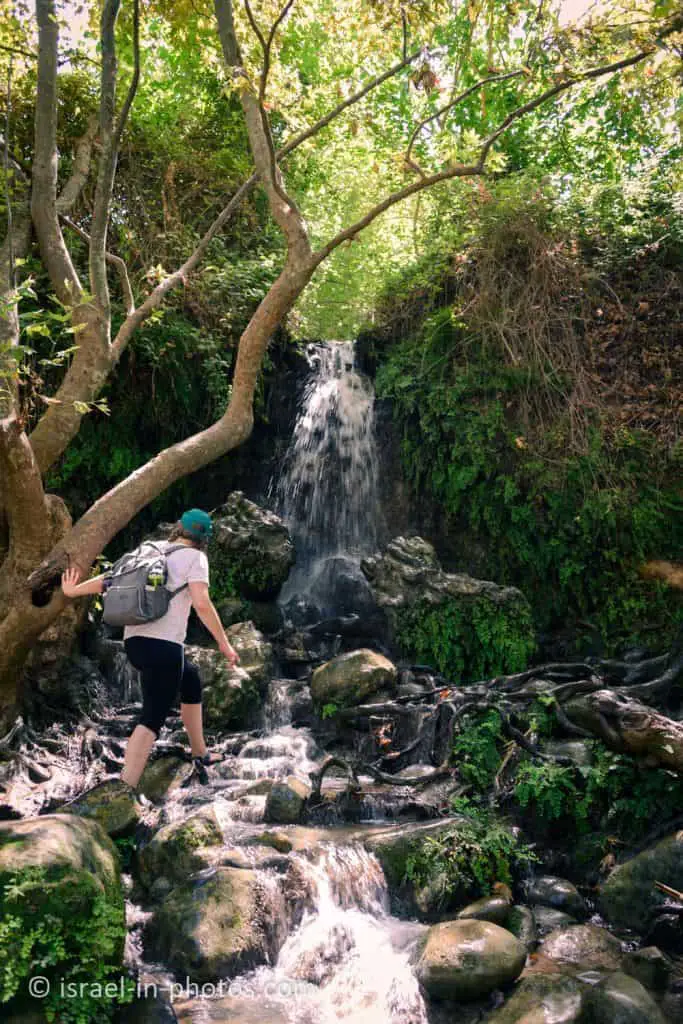
Shortly after the stairs, you will see a trail split. You can use the Israel National Trail marking and head to the long trail. Or you can return to the parking lot using the blue trail. As we understood from the local guide, the long path has another longer water hiking section (similar to the one we just did).
We decided to return to the parking, and we passed through the senses park on our way.
Senses Park
This park is similar to barefoot trails in other national parks. It allows kids to experience and see nature in different ways.

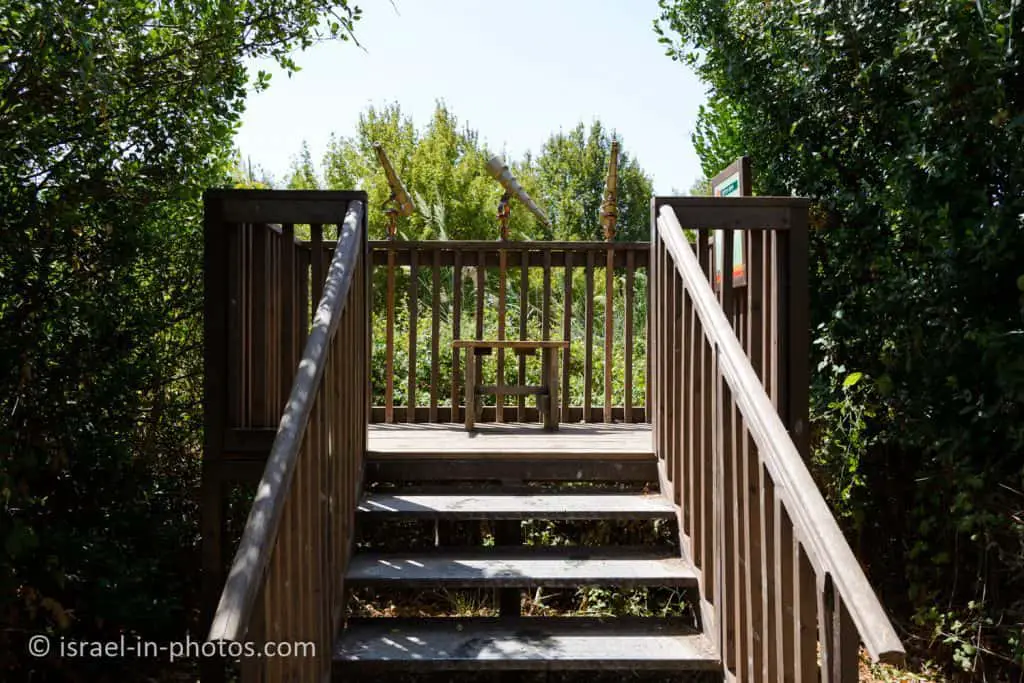
You can enter the Senses Park from the picnic area.
The senses park has a short loop trail, and my children enjoyed exploring it. That was a lovely addition to the track.
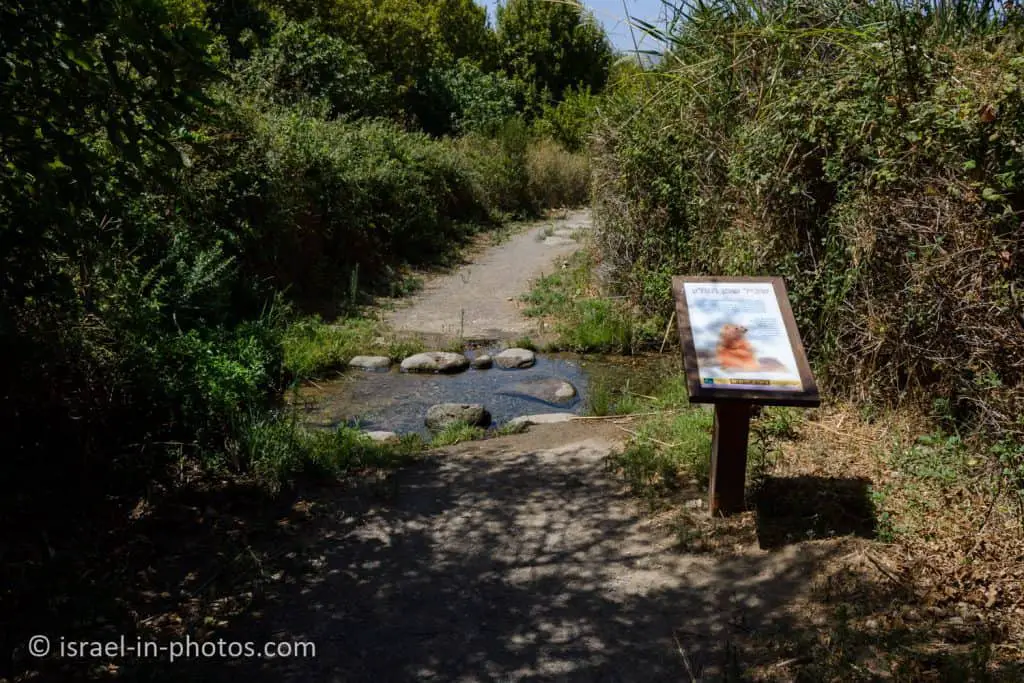
Wildlife
We visited during summer school vacation. Hence there were lots of people, and we did not see wildlife. But if you visit with fewer people, you might be luckier.
The world of wildlife at the nature reserve includes both water-loving species, mainly active along the riverbed and in the thickets of vegetation alongside it, and species preferring dry land, typically found on the slopes that are further away from the stream.
Despite the limited size of the nature reserve, it is also home to a variety of mammals. Special among these is the otter (Lutrina) – a small predator that feeds mainly on fish and is in danger of extinction in Israel. Otters are mainly found in Israel today in the Hula Valley. In the past, they also lived in the Jordan Valley, the Jezreel Valley, and along the coastal plain – in the vicinity of the perennial streams. In order to improve the chances of survival of the otters in this area, “otter passages” have been made underneath the bridges, allowing them to cross between the different parts of the stream even when the current is particularly strong. Otter activity is also monitored, both by surveillance cameras and by documenting tracks and droppings found in the area of the reserve. Once a year, in October, “Otter Day” is held at the reserve, when visitors are given an explanation about this rare species, and special activities take place.
Other notable animals in the nature reserve are wild boar (Sus scrofa), porcupines (Hystrix), mongooses (Herpestes), and badgers (Meles). In the Tapline reservoir, it is possible to find many water birds, while various species of birds nest in the travertine walls in the quiet areas of the reserve.
Alongside the mammals and birds, invertebrates also live in the reserve: river crabs, dragonflies and damselflies, primitive crustaceans, and water insects. Bathing by visitors in the waters of the nature reserve harms the activities of the invertebrates, and for this reason – and also for safety considerations – it is not permitted to enter the water in most of the area of the reserve.

Summary
Snir Stream Nature Reserve (Hasbani) offers various loop hikes, including water hikes that perfectly suit the hot summer days. The adults and the children enjoyed the hike, and we will surely return to visit the other trails.
This area has many attractions, and you can explore them using the interactive map above.
Have you visited Snir Stream Nature Reserve (Hasbani)? Tell us in the comment below about your experience.
That’s all for today, and I’ll see you in future travels!
Stay Tuned!
Additional Resources
Here are several resources that I created to help travelers:- Trip Planner with Attractions and Itineraries is the page that will help you create your perfect travel route.
- What is the Best Time to visit Israel? To answer this question, we will consider the weather, prices, holidays, festivals, and more.
- Information and Tips for Tourists to Israel will answer the most common questions tourists have about Israel (including safety, passports, weather, currency, tipping, electricity, and much more).
- Israel National Parks and Nature Reserves include a complete list, top ten, map, tickets (Israel Pass, Matmon, combo), and campsites.
- If you are looking for things to do, here are the pages for Jerusalem, Tel Aviv, Haifa, Sea Of Galilee, Akko (Acre), Eilat, Nazareth, Safed (Tzfat), and Makhtesh Ramon.


